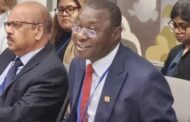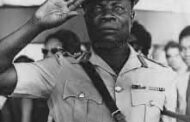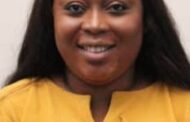Lawyer Paul Asibi Abariga was giving them a humour-laced lecture when I arrived. After some time, a number of them filed out of the judge’s chamber to join their colleagues. They had had a special one-on-one session with the judge, Justice Mary M.E. Yanzuh, where they received a lecture and had some questions answered.
When the judge returned to sit, she made an appeal to the lawyers on both sides of the case that afternoon. The uniformed guests from the flood-prone part of Kaneshie, who had taken the places of uniformed guests from Nsawam who often filled that court, were there to learn.
They would leave the court midway through the trial, so she would pause trial and allow them to ask questions, the judge told the lawyers. She told them to bear with her and them, especially them, for they were not conversant with the legal processes. However harsh or otherwise they framed their questions should be tolerated and answered.
When the trial paused and guests of the court took up the floor, they did not disappoint. The first few questioners appeared nervous, but, hey, who doesn’t appear nervous in court? Maybe just a few criminals. Even judges, once in a while, feel nervous in their own courts.
The first questioner wanted to know how lawyers balanced their moral principles with having to defend known criminals. That was followed by the question among the lawyers of who should respond to him. The lot fell on Dr. Isidore Tufuor, the Director of Prosecution at the Office of the Special Prosecutor, who is a law lecturer. But he got support from the other lawyers present. And, of course, the judge.
It soon became a lively interactive session. The voices that followed lost every trace of nervousness. And the questions were fired at both the bench and the bar.
One needed a response to the assertion that “lawyers are liars”. Another wanted to know whether lawyers who defended known criminals would eventually be punished if the court found out that the criminals were guilty of the crimes. Was it possible for criminals to walk free while the innocent got punished in the legal process? The judge had told them about the hierarchies in the court system, so one student wanted to know whether a lawyer who defended people at the superior courts could also defend people at the lower courts. Could lawyers defend themselves in criminal cases?
Then there was a question about the alphabet people, as Dave Chapelle calls the LGBTQ+ community. I don’t quite remember the exact question, but I remember the response Dr. Isidore Tufuor gave, which was affirmed by the judge and other lawyers.
As of April 26, 2023, identifying as a member of the LGBTQI+ was not criminal under Ghanaian law. Pending the outcome of the legislation being considered by the Parliament of Ghana, sodomy was the only criminal offence in the LGBTQ+ equation.
“Do you know what sodomy is?” Lawyer Abariga shot a question at them.
There was no response after he repeated the question.
“It is anal sex,” he said it in a way that carried more meaning to the court’s guests, who were from the all-male senior high school, Accra Academy.
Another student shot a direct question at the judge. He wanted to know Justice Mary Yanzuh’s personal position on LGBTQI+.
The judge did not take the bait. As a judge, she was unable to share her personal views on certain things publicly, she explained.
The interaction was interspersed with light moments, such as when the lawyers responded “amen” to the judge jokingly telling the students that lawyers, and not judges, were rich. One lawyer told them the lawyers would also make disclosures about the comfortable lives of judges so they could compare and decide which was the juicer job. Lawyer Abariga said they should go into farming, and not law, if they wanted to make money.
When the students exhausted their questions, the judge thanked them for coming and opened her doors to them for future visits. She left them with the motherly advice every boy their age would get before leaving home for secondary school.
You guessed right!
As they filed out, the business of the day resumed. The journalist who produced the “Contract for Sale” documentary in 2019 was being cross-examined in the trial of the former PPA CEO and his brother-in-law.
He had wished he was in court as a “free man” so he could take copious notes of the live and lively session for a write-up later. In the witness box, your pen and note pad and phones are prohibited materials. Fortunately for him, it was one of the rarest sessions in court when misreporting could hardly be cited for contempt so would trust his memory and recount the proceedings of that day.
He had not been as lucky as these students of Accra Academy. Back in Kete-Krachi, he completed secondary school without ever seeing a lawyer. In that peninsular district, he had dreaded the courtroom. It was a common saying whenever someone was charged that “you cannot litigate against the government, so plead guilty and your sentence would be reduced.” That was often the advice before the person appeared before the magistrate court.
Later in life, he grew to realise that about 80% of the people who went to jail in the district magistrate courts would have walked free or had significantly minimal sentences, if they had legal representation. It is a reason he thinks those restricting legal education to a select few are retrogressive and, perhaps, ignorant of the dire need for lawyers in the rural parts of Ghana.
He did not know whether things had changed, but, growing up, he was conscious of how the unholy alliance of the traditional ruler or chief, the district police commander, the district magistrate and the district chief executive of a place could become a deadly force that could determine who was free and who went to jail or got remanded even if the person did not do what warranted that punishment. Only a few magistrates stood their grounds, and they were often accused of disrespecting traditional authority.
He did not only envy the exposure these students got, but he also admired how practical learning was at its best. It was a very civilised session typical of advanced countries, where things are done properly, where humans live and behave like humans and where the little things that matter are given more attention than our fight against galamsey.
If any of these students, like him, were growing up with a phobia of judges and the courts, the welcoming disposition of Justice Mary Yanzuh and the lively interaction with the lawyers would cause them to begin to see the court differently.
And that is progress.
Source:Mybrytfmonline.com




















































